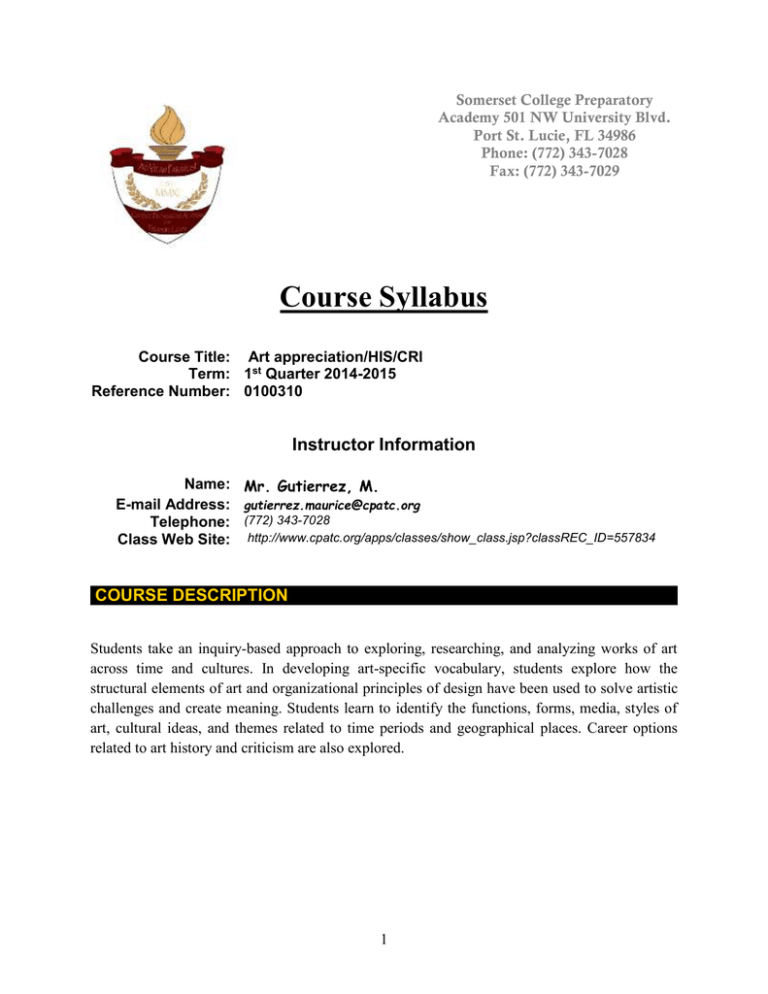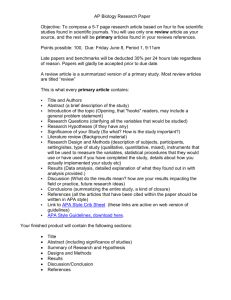Syllabus Art History Appreciation - Somerset College Preparatory
advertisement

Somerset College Preparatory Academy 501 NW University Blvd. Port St. Lucie, FL 34986 Phone: (772) 343-7028 Fax: (772) 343-7029 Course Syllabus Course Title: Art appreciation/HIS/CRI Term: 1st Quarter 2014-2015 Reference Number: 0100310 Instructor Information Name: Mr. Gutierrez, M. E-mail Address: gutierrez.maurice@cpatc.org Telephone: (772) 343-7028 Class Web Site: http://www.cpatc.org/apps/classes/show_class.jsp?classREC_ID=557834 COURSE DESCRIPTION Students take an inquiry-based approach to exploring, researching, and analyzing works of art across time and cultures. In developing art-specific vocabulary, students explore how the structural elements of art and organizational principles of design have been used to solve artistic challenges and create meaning. Students learn to identify the functions, forms, media, styles of art, cultural ideas, and themes related to time periods and geographical places. Career options related to art history and criticism are also explored. 1 SUGGESTED TEXTBOOK: Notes to student: Suggested for all courses: Publication Manual of the American Psychological Association (APA) (6th Edition), 2009. ISBN#: 978-1-4338-0561-5 APA Manual: The APA Manual 6th Edition is a suggested textbook for all courses. For a sample APA style paper please click here. COURSE OBJECTIVES: Please Note: Instructional time to implement this material/activities described in this syllabus, might vary according to the ability level of students. Apply art knowledge and contextual information to analyze how content and ideas are used in works of art. Analyze how visual information is developed in specific media to create a recorded visual image. Assessing our own and others’ artistic work, using critical-thinking, problem-solving, and decision-making skills, is central to artistic growth. Classify artworks, using accurate art vocabulary and knowledge of art history to identify and categorize movements, styles, techniques, and materials. Compare artwork, architecture, designs, and/or models to understand how technical and utilitarian components impact aesthetic qualities. The processes of critiquing works of art lead to development of critical-thinking skills transferable to other contexts. Use descriptive terms and varied approaches in art analysis to explain the meaning or purpose of an artwork. Make connections between timelines in other content areas and timelines in the visual arts. SKILLS, TECHNIQUES, and PROCESSES: Through dance, music, theatre, and visual art, students learn that beginners, amateurs, and professionals benefit from working to improve and maintain skills over time. The arts are inherently experiential and actively engage learners in the processes of creating, interpreting, and responding to art. Interpret and reflect on cultural and historical events to create art. 2 HISTORICAL and GLOBAL CONNECTIONS: Experiences in the arts foster understanding, acceptance, and enrichment among individuals, groups, and cultures from around the world and across time. Through study in the arts, we learn about and honor others and the worlds in which they lived. Examine the significance placed on art forms over time by various groups or cultures compared to current views on aesthetics. Describe the significance of major artists, architects, or masterworks to understand their historical influences. The arts reflect and document cultural trends and historical events, and help explain how new directions in the arts have emerged. Analyze artwork from a variety of cultures and times to compare the function, significance, and connection to other cultures or times. INNOVATION, TECHNOLOGY, and the FUTURE: Curiosity, creativity, and the challenges of artistic problems drive innovation and adaptation of new and emerging technologies GRADING: ● ● ● ● ● ● Class Participation in Case Discussions APA Research Papers Case Presentations and Moderation Quizzes Tests Homework 10% 15% 15% 25% 25% 10% 100% GRADE QUALITY POINTS: [90-100] [80-89] [70-79] =A =B =C [60-69] Below 59 =D =F 3 Course/Departmental Policies Always raise your hand and wait to be called upon. If you see that I am busy, wait a few minutes and try again. This is very important if everyone in the class is talking at the same time, I cannot listen carefully to your question. Do not get out of your seat without permission. Keep hands to one self any groping; fondling and or unwarranted touching will result in a disciplinary action. All research papers must include a certificate of authorship signed by the student. Professional quality in the organization, completeness, neatness, and timeliness of any material submitted is expected. Late assignments will not be accepted! However, the professor realizes that exceptional situations (such as justified emergencies or medical situations) do occur. In such cases, please inform your professor via e-mail to obtain special permission for late submission, prior to the deadline. A student may not do additional work or repeat an examination to raise a final grade. Students should be aware that any submitted work for this course may be subjected to detection of breach of copyright. Be polite and respectful to everyone. It is fundamental to your ability to learn. Kindness is one of the best characteristics a person can have. Be kind all the time. BE ON TIME. If you consistently arrive late to class, you will miss important information that will affect the learning process of the subject matter. Three unexcused tardies will result in one lower grade in conduct. Be prepared. Bring all the required materials to class including the following: pencils (#2), erasers, highlighters (3 different colors), a pencil sharpener with bin, a binder, lined paper, and a 6- pack coloring pencils. Follow directions. You must pay attention in class and follow all directions for each assignment. This requires you to listen to all instructions carefully. It is important that you work quietly and talk ONLY when given permission. Turn in all homework assignments on time. I will lower one letter grade each day the assignment is late. 4 Wear proper uniform. Talking with others, disrupting class and being a class clown will not be tolerated. Throwing objects in class at others will not be tolerated. Any electronic devices unless authorized will be confiscated. Failure to comply with the above rules will result in the following consequences: Warning Teacher/ student conference Parent contact (telephone, letter, etc.) Team parent/student conference Referral to counselor Administrative referral 5 *Acknowledgment* **Please sign and return the following portion of the Syllabus and keep the previous pages for your records. ** I have read and completely understand the Syllabus for Mr. Moe’s U.S. History class. I have reviewed the Syllabus with my parents. I understand what is required of me. I am going to work hard and I will do my best. I will also participate in class and turn in all my homework on time. Student’s Name: ________________________________________________________ Period # _____________________ Date ____________________________________ Student’s Signature _______________________________________________________ Parent’s Signature ______________ Date _____________________________________ 6





